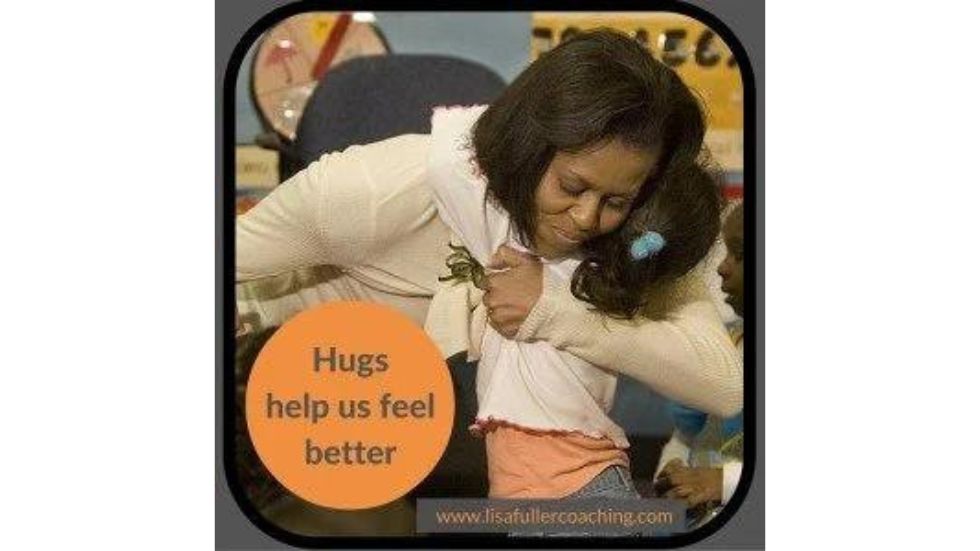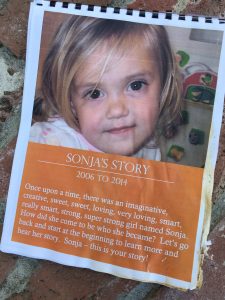
by Lisa Fuller | Apr 14, 2021 | Communication, Connection & Love, Feelings & Emotions, General, Power struggle, Self-care, Self-regulation, teenager
As I write today I’m reminded of a post I wrote 8 years ago, What I Did When My Daughter Said, “You’re the Boringest and I Hate You! This time, however, it’s not what she said, but instead what she didn’t say and didn’t do that shined a light on some difficult parenting wisdom.
Part I – The Sweater
It all began when I knit my 14 year old daughter a sweater. She’d accompanied me to the store to choose a soft, washable yarn in a neutral color she’d actually wear. During Covid I’ve picked up knitting again and found a healthy distraction in searching for patterns and scrumptious yarns. Because my grandmother taught me to knit when I was young, knitting sent a gentle signal to my brain, “Everything’s okay.”
A couple of weeks ago when I completed the sweater, I laid it on her bed so she’d see it when she got home. I imagined she’d try it on and show me how it fit. Over the past month I’d measured the length of her arms, inquired about how cropped she’d like it as that’s the current fashion and worked to tailor it just for her.
Because she never mentioned the sweater, I checked in with her in the afternoon, “Did you see the sweater? Please try it on — I’d love to see how it fits.”
She answered, “Not right now.”
Later I asked her again and she explained that she’d already changed into her pj’s but that she’d do it the next time she got dressed. The next day I decided to mention it one last time. My heart felt heavy. I didn’t want to get entangled in a power struggle with her over the sweater I’d made for her because I adore her. Needless to say, I never saw it on her.
Part II – The Pile
My daughter had recently cleaned out her room, placing all outgrown and unwanted items into a huge bag in the hall. Beside the bag was a loose pile of papers with a blue glue gun resting on top.
After a few days of watching the pile collect dust, I took a closer look and saw under the glue gun a photo storybook I’d created and given to her for her birthday some years ago.
This project, with a closeup of her soft two year old face on the cover looked to have seen better days. I picked it up and brought it into her room asking, “What’s happened to this?” She confirmed that she’d found it spoiled, likely because last fall she’d placed a little pumpkin from our garden on top of it, in a drawer. The pumpkin decomposed over the course of months.
I felt an anger rise in me and said, ‘You clearly don’t care about it.”
She answered, “I do care.”
I said, “If you cared you’d have come to me when you found it and asked what we could do.” I swore, “Just f***ing get rid of it then, but don’t leave it on the floor for me to take care of.”
Heart pounding, I retreated to my bedroom across the hall where I stood motionless, a little shocked that I’d spoken to her so harshly. Being the youngest child she was adept at avoiding conflict and I’d become more able to keep my cool.
For a split second I thought, I’m going to ignore her, give her the cold shoulder. A memory flashed from the recesses of my mind of my dad ignoring me for two weeks after his feelings had been hurt because I’d been spending weekends at my friend Sharon’s house. I can remember him scolding me as we stood inside our front door, “You care more about her family than you do your own!” I was in 5th grade at the time and it was two weeks before he looked at or spoke to me again.
I decided I wasn’t going to ignore her, even though to hurt her back felt like the “natural” response.
Returning to her room, disintegrating storybook in hand I said, “I realize the reason I’m so upset is that my feelings are hurt. It’s becoming clear to me that you don’t care about things I’ve made for you.”
I was of course thinking about the unadorned sweater.
I repeated myself, “It’s becoming clear to me, and I’m speaking to myself now, that I need to focus less on you and more on myself.”
I felt my voice catch and tears well in my eyes.
Unlike 8 years ago, this time she said nothing. Through the uncared for storybook and forgotten sweater I was getting a message loud and clear, “Mom, get a life. While I need you to be there for me, I don’t need you the same way I used to and I’m not going to act in ways to please you. You haven’t trained me to take care of you and I’m not going to start now. My main concern right now is my friends and all the changes I’m going through. You can’t use me to feel good about yourself.”
I felt grounded when I turned to leave her room, closing the door quietly behind me.
I haven’t figured it all out yet.
It felt valuable to write about and share with you because it’s not spit spat all settled in me and tied up with a bow and maybe you’re having your own messy parenting moments. I’m sitting with a real life collision between my daughter’s age appropriate growth and what I’m gently naming my age appropriate stuckness, a slice of difficult wisdom.
It’s not only children who grow. Parents do too. As much as we watch to see what our children do with their lives, they are watching us to see what we do with ours. I can’t tell my children to reach for the sun. All I can do is reach for it, myself.
— Joyce Maynard

by Lisa Fuller | Mar 26, 2016 | Communication, Connection & Love, Encouragement, General, Parenting, Self-regulation
Shortly after Eric finished up my 7- week parenting series, he sent me this story which beautifully illustrates the power of asking for a hug.
Last week on my way home from work, my wife Stephanie sent me a text that our daughter Grace (5) was being a handful, was in a horrible mood and that she had had it with her.
When I got home, I walked into the house and went straight to Grace and asked her for a hug. At first she turned her back and crossed her arms, and said no.
I then decided to ask her one more time and after a 5-second pause, she turned and gave me a big hug.
Steph said it was like someone flipped a switch on Grace. She went from being in the worst mood to acting as if she was having the best day ever.
It’s amazing to see the kind of impact and dynamics that something as simple as asking for a hug can have on a 5 year old.
Honestly, before taking your class, I probably would have come home and punished Grace for misbehaving and the entire afternoon would have been ruined for the whole family.
Asking for a hug sounds almost too easy, right? Too simple to be true?
However, while it’s simple… there’s a subtle tweak that’s key to the effectiveness of this parenting strategy.
“I could use a hug” vs. “Can I give YOU a hug?”
The first taps into your child’s deep need for significance and belonging. When you ask for a hug from your child, you acknowledge that they make a difference to you and in fact have a positive influence on your life.
In the later, you are reinforcing what your child hears and perhaps feels frequently: That children need help from grownups to feel better.
The parenting tool of asking for a hug (for YOU) is simple, easy, and effective if done from the perspective of genuine connection, genuine desire for your child to assist you! (Plus, who doesn’t love hugs? I love it!)
Try it out.
Ask a friend to be your parent and say these two phrases to you:
Could you give me a hug?
and
You look like you could use a hug.
Do you notice a difference in how you feel after each?
This week look for an opportunity to ask your child for a hug.
I’d love to hear how it goes in the comments below!

by Lisa Fuller | May 27, 2014 | Communication, Cooperation, Discipline, Encouragement, General, Parenting
It’s a typical morning, nothing out of the ordinary.
The boys haven’t brushed their teeth and I’m yelling, BRUSH! And then Get your rears in the car NOW.
It feels like we do this every. Single. Day.
When I get in the car, I feel down – this isn’t how I want my boys to get off to school in the morning. Yelling let’s go, let’s go, let’s gooooo! – Probably isn’t the most inspirational start to their day.
Sound familiar? I know we all prefer mornings with our kids to be fueled by calm cooperation instead of high-volume threats and pleas!
It is possible.
I got the idea to create scripts because in a parenting class while role-playing a conversation, between a parent and teen (forgetting to talk out the garbage), using Positive Discipline tools, an observing parent vigorously raised her hand, “You were going really fast just then and I’m not sure what happened but it sounded awesome. Could you go through it again but this time slowly so I can understand?”
At first, the words may feel a little stiff or clunky – just like training wheels – but it’s worth giving them a try. Especially if you leave the house in the morning shaking your head (or crying), wondering why parenting is so darn hard.
The Conversation Guide slows down the parent child interaction. Think of it as parenting in slow motion, word by word, so you can rewind at any time.
It’s true, there are many ways to parent that fit with the Positive Discipline principles. My hope is that the four approaches I’ve offered here give you confidence to find your genuine voice. One that’s both kind and firm – respectful of your child and yourself.
Okay, back to my morning with the boys… what could I have done differently? Let’s see what happens when I ask a question instead of yelling demands at them.
“Guys, what do you need to do before you get in the car for school?” They actually mumble “brush our teeth…”
“Yes, great, I’ll meet you in the car when you’re done.”
Does that sound too easy? With enough repetition, time and the resulting trust, it works.
And if you get zero response to your question – or just eye-rolling – you can calmly let them know you’ve decided to wait in the car until they’re ready (take a good book so you’re doing something pleasurable while you serenely wait).
The two keys are:
- You follow through with what you say you’re going to do – this builds trust
- You remain calm, cool and collected – trust x 100
CONSIDER⇔SHARE⇔ACT
What get’s in your way of having that calm morning you so desire?
What’s worked for you?
What gets in the way of you practicing these scripts? Share in a comment below so we can learn from each other.
If you haven’t already done so, join me on this journey!
Wanna talk? Schedule a time here.

by Lisa Fuller | Apr 29, 2014 | Connection & Love, Cooperation, General, Parenting, Self-regulation
You know those times when you’ve just got to get your child to do something important (go to the doctor, to swim class, the dentist…) and she/he refuses to cooperate? Then you think, “Why can’t they just get with the program this one time? Why does everything have to be so hard?”
Well, let me introduce Susan, mother of 9 year-old Alex, and a recent graduate of my 7-week parenting class. In this story, Susan shares the remarkable shift that happens when she uses tools she learned in the series. Without giving too much away, here are the two conversations (with very different outcomes) between Susan and Alex:
BEFORE taking Positive Discipline Class
Susan: “Hey Alex, Dad and I forgot to tell you – Swim lessons start today, so you need to get ready to go.”
Alex: (Playing with Legos) “What? I don’t want swim lessons! You know I hate lessons!”
Susan: “Alex, learning how to swim is really important – it’s about safety.”(Susan begins to feel angry and thinks, “What’s so hard about going to swim class? Swimming is great. This should be fun. Why is it so difficult?”)
Alex: “I don’t want to.”(He starts to crush his elaborate Lego creations). “I’m not going.”(He sits defiantly on the couch.)
Susan: “Swim lessons are a privilege, young man. That’s enough of your whining. Stop it. Now!”
Alex: “You never ask me what I want – I HATE YOU!”
Susan: (Thinking… “I hate this. I hate how hard it is to motivate my son. Forget it, I give up.”) She stomps off to another room to grab the swim gear.
Susan: “We paid for this class. Now get up and get to the car!”
Susan and Alex are both miserable and swim lesson does not go well.
Sound familiar?
AFTER taking Positive Discipline Class
Susan: (Taking some time beforehand to prepare herself.) “Hey Alex, Dad and I forgot to tell you but you’ve got swim lessons today. I’m really sorry that we’re springing this on you, but we gotta go now. I’ve got your swim gear and a snack for the car.”

“Both of these Positive Discipline Tool Cards were key. I feel I learned the most about the power of validating feelings!“
Alex: “What? I don’t want swim lessons! You know I hate lessons!”
Susan: “Honey, you only have to go four times and we found a new place where there are fewer kids so you’ll be able to hear better.” (She shows remorse for not giving him any warning and feels empathy for him, knowing that while he hates lessons, he actually loves to swim.)
Alex: “I don’t want to!” (He starts to crush his Lego creations.) “I’m not going.” (Alex plops himself defiantly on the couch.)
Susan: “Alex, sweetie, I know this is upsetting, but destroying your Legos is not OK. You can hit a pillow if you’re angry.” (She allows him to express his feelings. She calmly and firmly tells Alex that swim lessons are something he just needs to do. Susan uses only one or to sentences instead of lecturing him.)
(Alex violently hits the pillow. Susan leaves the room. Then she remembers that staying with him might feel encouraging to him. She goes back and keeps him company but doesn’t try to fix or change his feelings.)
Susan: (After some time has passed, speaking gently…) “Honey, it’s time to go.” (Alex gets up and together, they walked to the car. During the drive Susan felt connected to her son through their easy conversation and a palpable sense of calm. Alex even seemed to enjoy the lesson!)
This story’s a beautiful example of how empathy and encouragement go a long way toward winning genuine cooperation. Through her use of grounded positive energy and empathy Susan not only accomplished her goal of getting Alex to his swim lesson, she laid the groundwork for a foundation of trust.
Later she she told me,
It was a tiny miracle that I didn’t lose it and Alex was able to get up to walk to the car. It worked mostly because I didn’t flip my lid. Being there while he hit the pillow actually calmed me down too! Now Alex is doing great with his lessons. He still complains, but there is an ease and matter-of-factness about our interactions.
Thank you Susan for sharing your story!
If you’re curious about deepening your parenting practice and learning the art of cooperation through empathy, check out my one-on-one coaching opportunities and it you’re in the Bay Area, my fall Positive Discipline Series.
CONSIDER⇔SHARE⇔ACT
What gets in your way of just being with your child while they’re caught up in a feeling? Next time a big emotion hits, try bearing it with an attitude of love and let us know what happens!!








